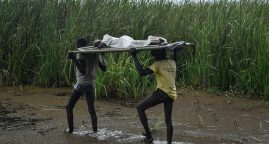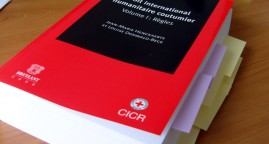New study reveals increasing threats of cumulative climate hazards around the world
Article published on University of Southampton website on 12/19/2018
A new study provides one of the most comprehensive assessments yet of the impact of the simultaneous occurrence of multiple climate hazards. This research reveals that societies face a much larger threat from climate change than previous studies have suggested.
The analysis of thousands of scientific papers reveals 467 ways in which human health, food, water, economy, infrastructure, and security have been impacted by multiple climatic changes including: warming, drought, heat-waves, wildfires, precipitation, floods, storms, sea level rise and changes in land cover and ocean chemistry.
The study, published in Nature Climate was led by Camilo Mora of the University of Hawaii and co-authors include Professor Justin Sheffield from the University of Southampton. Professor Sheffield’s research into how climate and water interact over time in different locations was used to analyse where droughts can occur in the future and what their impact could be.
The vast majority of recent studies into the increasing risks of climate hazards have studied the effects of each hazard individually. However focusing on only a small number of hazards may ignore the combined impact they have with other hazards, resulting in incomplete assessments of the consequences of climate change on communities.
Ongoing greenhouse gas emissions are known to increase atmospheric temperature, in turn resulting in drought, wildfires and heatwaves in normally dry places or massive rain and floods in commonly wet areas. In the oceans, warmer waters also evaporate faster increasing wind speeds and the downpours of hurricanes, whose surges can be aggravated by sea level rise. As a result, greenhouse gas emissions can aggravate simultaneously multiple climate hazards.
The study details how these hazards have already impacted human health, food, water availability, and infrastructure including electricity, transportation and “life line” services such as water and sewage lines. Climate hazards also have incurred economic losses including property damage, agricultural losses and job losses, all while triggering multiple cases of migrations and violence.
Professor Sheffield from the University of Southampton said: “This research indicates that we should not expect a future of individual hazards such as heatwaves or droughts, but one in which we should be prepared for the impacts of multiple types of climate hazards at the same time, even in the UK.
“For example, London and the South East of the country can expect more than one concurrent climate hazard by the end of this century if greenhouse gases are strongly mitigated, and three if they are not, including sea level rise, warming, more severe drought and precipitation extremes, and even freshwater deficit.”
The study also showed that by the year 2100, New York will face the equivalent of one climate hazard, if greenhouse gas emissions are strongly mitigated or four if they are not, including sea-level rise and extreme precipitation. Los Angeles will face three concurrent climate hazards, Mexico City will face four, and the Atlantic coast of Brazil will face five. Even under strong mitigation scenarios, increasing cumulative exposure to the multitude of climate hazards will impact rich and poor countries alike and especially in tropical coastal areas.
“Greenhouse gas emissions pose a broad threat to humanity by simultaneously intensifying many hazards that have proven harmful in the past” says lead author Camilo Mora of the University of Hawaii.
“The collision of cumulative climate impacts is not something on the horizon, it is already here,” says Mora. “Last year, for instance, Florida recorded extreme drought, record high temperatures, over 100 wildfires, and the strongest ever recorded hurricane, the category 4 Hurricane Michael.”
The paper concludes: “Overall, our analysis shows that ongoing climate change will pose a heightened threat to humanity that will be greatly aggravated if substantial and timely reductions of greenhouse gas emissions are not achieved.”
Related Articles
Local aid agencies: still waiting for a bigger share of the funding cake
03/27/2017. Donors and UN agencies who agreed to provide at least one quarter of humanitarian aid funding “as directly as possible” to local NGOs are struggling to deliver on their pledge.
Denmark will get world’s first tech ambassador
01/27/2017. The job is yet to be filled, but the move highlights the growing importance of the tech sector for the Danish economy.
The Practical Guide to Humanitarian Law
April 2017. The Practical Guide to Humanitarian Law was published for the first time by Françoise Bouchet-Saulnier in 1998is on line.






